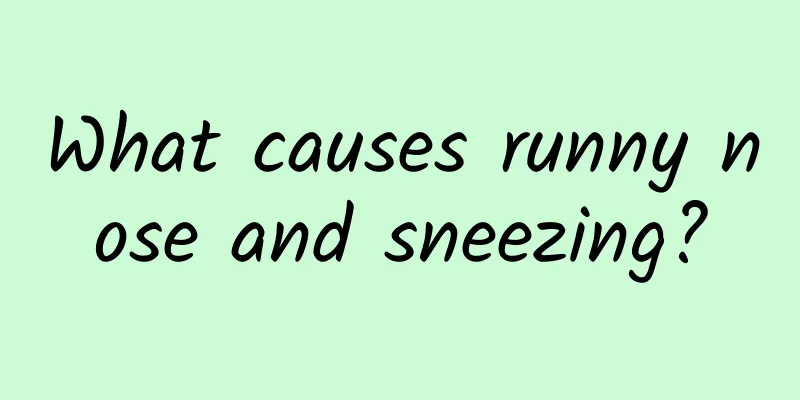What causes runny nose and sneezing?

|
When people have a runny nose and sneezing, they will naturally think that they have caught a cold, so they will take some cold medicine for treatment. But did you know that it is not only colds that cause runny nose and sneezing? Allergic rhinitis can also cause runny nose and sneezing. If you simply think it is a cold, it will not solve the problem at all. Therefore, for friends with allergic rhinitis, if they have a runny nose and sneezing, they should first check whether it is rhinitis, and then consider whether it is a cold. This will be more effective in solving the problem. It is reported that the temperature changes unpredictably during the transition from summer to autumn, which is the peak period for allergic rhinitis. "The number of such patients has increased significantly during this period. We see more than 20 cases on average every day." Gu Xiling, deputy chief physician of the Department of Otolaryngology at Zhuji People's Hospital, said that when allergic rhinitis occurs, there will be symptoms such as nasal itching, sneezing, clear runny nose, and nasal congestion. People from young children to the elderly can suffer from the disease. "It is worth noting that since the initial reaction of allergic rhinitis is very similar to that of a cold, it can be easily mistaken for a cold. Among the patients who come to the hospital for treatment, 30% of them have their treatment cycle delayed because of this." How to distinguish between a cold and allergic rhinitis: Generally, the symptoms of a cold will be alleviated or disappear after a week, but this is not the case with allergic rhinitis, and the symptoms will recur. Therefore, if you suspect you have a cold and your symptoms do not improve or recur after taking medicine for a week, it is best to go to the hospital for a check-up. "Don't underestimate this disease, because many patients will suffer from sinusitis, pharyngitis, bronchitis, and even allergic asthma." Doctors remind that the key to preventing allergic rhinitis is to identify the allergic factors and avoid them. You should avoid allergens such as pollen, dust mites, blankets or animal dander in early autumn, and eat less cold drinks, ice cream and other foods. Patients with rhinitis can prepare 0.9% saline solution by themselves or go to the hospital to clean the nasal cavity, which can relieve symptoms appropriately. When nasal congestion is severe, do not blow your nose forcefully to avoid otitis media. I believe you already know how to distinguish whether a runny nose and sneezing are caused by rhinitis or a cold. When you have a runny nose and sneezing again, please first distinguish the cause and then take medication. I believe you will be able to solve the problem soon. For patients with allergic rhinitis, you must pay attention to preventing the disease. |
<<: Early symptoms of lymphoma
>>: How to deal with itchy skin
Recommend
What to eat before giving birth to help the cervix open
In the late stages of pregnancy, you should stren...
What causes lip inflammation and what are its types?
In winter, many people's lips are prone to dr...
Lateral incisor protrusion
Many people actually have crooked teeth. When fac...
The reason why women's palms turn yellow
For women, if the palms turn yellow, you should p...
High lymphocyte percentage
One of the indicators of whether a person is heal...
There is a hard lump in the anus but no blood in the stool
The presence of a lump in the anus is mainly caus...
When is it time to correct protruding teeth?
Buck teeth are a relatively common type of dental...
What are the side effects of internal suction eye bags
With the continuous development of science and te...
What are teeth made of?
Teeth are an important tissue in our body. The ma...
Six tips to enhance liver function that you should never miss
The liver plays a role in removing toxins, metabo...
What is the reason for grinding teeth while sleeping?
Teeth grinding mainly occurs in some young people...
What to do if you have back pain after confinement
Confinement is a process that most Asian women wi...
Symptoms of Skin Cancer
When it comes to cancer, people always seem to be...
Late symptoms of heart failure and renal failure
For patients with renal failure, some complicatio...
Heavy breathing, can't catch my breath
In daily life, many people have this feeling of b...









